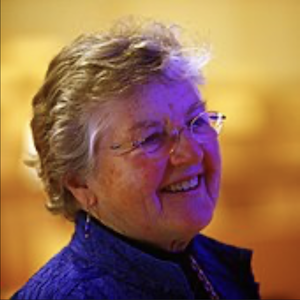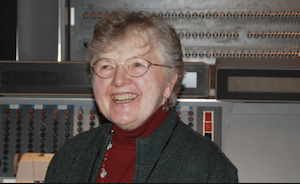
Frances Elizabeth Allen was an American computer scientist born on August 4, 1932, in Peru, New York. Allen was the oldest of six siblings, and they all grew up on a small farm in their hometown in New York, most notably near the famous Lake Champlain. Her father was a farmer, and her mother was a teacher at her local elementary school. From the start of her childhood, Allen was always interested in logical thinking and reasoning. She was captivated by mathematical concepts and related topics at a young age. Later, she would teach practical mathematics to a small group of students near her family’s farm. Although it is unknown where Allen attended grade school in her academic career, she sought higher education at The New York State College for Teachers, later graduating with a Bachelor of Science degree in mathematics in 1954. Furthering her educational career, Allen earned a master’s in Science in mathematics at the University of Michigan in 1957. Adding on, Allen then taught students mathematics in Peru, New York. Since Allen was in enormous debt, she joined the Thomas J. Watson Research Center at International Business Machines (IBM) to gain additional pay. She was first employed to teach others a newer computer programming language, FORTRAN. Allen also had a strong passion for her studies in the center, where she continued her job for another forty-five years. As time progressed, Allen met and then married Jacob T. Schwartz, an American mathematician, and professor of computer science.
Allen continued to work in the field of optimizing compilers, code optimization, and parallelization. Her contributions and achievements in the computer science department also made her the President of the IBM Academy of Technology in 1995. Allen’s most notable achievements included being the first female IBM Fellow to receive the A.M. Turing Award in 2006. This was legendary for many women in the technology field as it broke barriers and the gender gap in STEM. Allen has also been inspired by her mentors, educators, professors, and teachers. She states that those people are the ones who get her captivated by such topics.
Allen wanted to diversify the workplace, so she taught others the value of computer science in society. Her contributions to computer science have advanced technology and compilers. She allowed other engineers to understand the optimization of code, analyze runtime efficiency, and understand the analysis of complex and high-level algorithms. Along with her awards and achievements, Allen also attended the U.S. National Science Foundation. She was nominated and elected to the U.S. National Academy of Engineering, the Association for Computer Machinery, the American Academy of Arts and Sciences, and the American Philosophical Society in 2001.

Allen also thought about the “code behind the code”; she always thought “outside the box” during her career. For example, her love of going on mountain-climbing expeditions was also fused into her coding adventures. She used her mathematics, problem-solving, and logical reasoning to find innovative solutions, putting code together step by step. Her passion for teaching others strengthened throughout her work career. Soon, she expanded her education career by teaching courses in mathematics and compilers to graduate students at New York University (NYU). She was able to demonstrate her past work to her students vividly and her students were able to explore compilers at an in-depth level immensely.
Closing her academic career and profession, she retired from her career in 2002. With Allen’s remarkable achievements in computer science, she was also awarded the Augusta Ada Lovelace Award from the Association of Women Computing in 2002. The impact of her accomplishments has not only broken the gender gap but inspired many women around the world to pursue computer science as a career. Her legacy continues today as many should acknowledge Frances Allen’s achievements and accomplishments in the technological world.
All in all, Frances Allen has also paved the way for women in computer science and motivated many to follow their dreams.“You need to hire and develop great people. You need to set the vision and trust them to do the right thing. You need to let go of control. That’s wonderful for all involved because you’re empowering and trusting your people to do what’s right for the brand.” Through this quote, Allen emphasizes and illustrates her strong thoughts and her idea of why many should be determined to achieve their goals and dreams. Ultimately, her contributions to modern-day society have shaped the future of computer programmers and scientists alike. Therefore, her aspirations and goals have impacted how many view coding, computer science, and technology for a better-brighter future.
Why Did I Choose to Research Frances Allen?
I chose to research Frances Allen for various reasons. My research findings taught me more about Allen’s life story as a successful computer programmer. Her aspirations and goals truly transformed the field of computer science with her contributions to compilers and machines. Moreover, the personal connection that I have to Allen is that I want to major in computer science in college. I could dive deeper into Allen’s journey to becoming a programmer through my research findings. Overall, Allen’s work ethic and efforts have contributed significantly to the world and the future of modern-day technological advancements.
Works Cited
Computer History Museum. (n.d.). Frances Allen. https://computerhistory.org/profile/frances-allen/
Fran Allen. (n.d.). Coders at Work. Retrieved November 19, 2022, from https://codersatwork.com/fran-allen.html
Frances ALLEN. (n.d.). Scientific Women. Retrieved April 11, 2022, from https://scientificwomen.net/women/allen-frances-108
Frances Allen: Fusing Passions into a Career. (2017, October 10). Tynker. Retrieved November 19, 2022, from https://www.tynker.com/blog/frances-allen-fusing-passions-into-a-career/
Hosch, W. L. (n.d.). Frances E. Allen | Biography, A.M. Turing Award, & Facts.Encyclopedia Britannica. Retrieved April 11, 2022, from https://www.britannica.com/biography/Frances-E-Allen
Steele, G. (n.d.). Frances Allen - AM Turing Award Laureate. AM Turing Award. Retrieved April 11, 2022, from https://amturing.acm.org/award_winners/allen_1012327.cfm
This article was published on 3/15/24